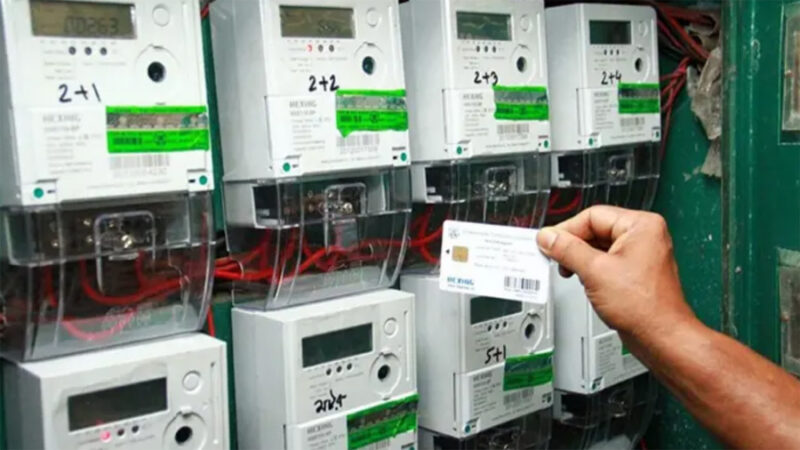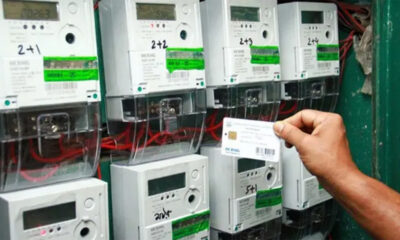Business
Exchange Rate: NERC to increase price of prepaid meters

Exchange Rate: NERC to increase price of prepaid meters
The Nigerian Electricity Regulatory Commission (NERC) is considering increasing the price of prepaid meters once again.
This consideration comes in response to the escalating production costs faced by meter manufacturers, according to sources familiar with the matter who spoke to Nairametrics.
These sources, who requested anonymity, revealed that manufacturers have ceased issuing invoices to Distribution Companies (Discos), in anticipation of an upward price revision by the NERC.
According to the sources, the increase in prices is directly related to the foreign exchange crisis affecting the economy, leading to increased production costs and inflationary pressures on manufacturers.
Earlier last week, NERC accused the 11 Distribution Companies (DisCos) nationwide of overcharging unmetered customers, resulting in a fine of N10.5 billion.
Meanwhile, an official from a Distribution Company informed Nairametrics that new applications for meters are no longer being processed, as there are indications that NERC will soon announce a new pricing rate.
The source also mentioned that the applications can only be processed once the new prices are announced, leaving many applicants without a prepaid meter.
He said,
- “The cost of prepaid meters is going to go up soon. Meter Asset Providers have stop selling new meters as they await NERC to approve new prices.
- “New meter applications are not being processed until the price changes are reflected.
- So due to FX issues, the meter manufacturers have stopped sending invoices until the meter price is reviewed.”
Some customers who spoke to Nairametrics complained of not being able to get meters despite applying weeks earlier and in some cases months. Others who had paid for their meters also complained of delays in getting the meters.
READ ALSO:
- BREAKING: Unknown gunmen kill APC spokesperson in Plateau
- How we were terrorised with poisonous snakes – Kidnap victims
- NDLEA intercepts large consignment of drugs from New York at Lagos Airport
Another DisCo source opined that the new applications for meters are not being processed until the cost of meters is reflective of the situation in the country. However, they stated that customers who have paid will get their meters and may not be required to pay any other cost regardless of whether a new meter cost is approved.
NERC, the sector regulator, approves the cost of prepaid meters, most of which are imported into the country as semi-knocked down units and assembled locally for use. Prepaid meters have also evolved over the years with DisCos including features that mitigate against energy theft and offering more consumption data.
Nigeria’s meter deficit is thought to be over 7 million as most customers continue to be billed on estimates.
The Manufacturers Association of Nigeria (MAN) has earlier reported in its ‘Manufacturing Sector Outlook for 2024’, the that average capacity utilization is expected to linger around the 50% mark due to forex-related challenges and the prevailing high inflation rate.
The report noted that forex crisis and high inflation in the country will limit its performance in Nigeria till mid-2024.
It said:
- “Average capacity utilization will still hover around the 50% threshold as the forex-related challenges and high inflation rate limiting manufacturing performance may linger until mid-year.
- “The sector may experience a meagre improvement in manufacturing output as forex and interest rates-related challenges are expected to subside from the third quarter.”
What you should know
With a 27 years high inflation rate of 29.90% and an incessant fall of the Naira against the Dollar in the FX market, Nigeria manufacturing industry continue to grapple with rising cost of production.
Last Increase
- In September 2023, NERC upwardly reviewed the price of prepaid meter in a circular marked NERC/2023/020, and jointly signed by Sanusi Garba, the commission’s chairman ’and Dafe Akpeneye, its commissioner, legal, licencing, and compliance.
- According to the circular, the commission said a single-phase meter will now cost N81,975.16 instead of the previous price of N58,661.69.
- Similarly, the price of a three-phase meter was increased to N143,836.10 from N109,684.36.
- At that time, inflation rate was 26.72% and $1 was around N800 in the official market.
- Meanwhile, inflation continues to worsen as the Naira loses over 40% of its value since the last evaluation of the price of prepaid meter.
- With a new price review prepaid meter price sight, consumers are more likely to pay over N100,000 for a single-phase meter and perhaps a N150,000 for a three-phase prepaid meter.
Exchange Rate: NERC to increase price of prepaid meters
Railway
Lagos Rail Mass Transit part of FG free train ride – NRC

Lagos Rail Mass Transit part of FG free train ride – NRC
The Nigerian Railway Corporation (NRC) has disclosed that the Lagos Rail Mass Transit (LRMT) trains are included in the Federal Government’s free train ride initiative for the Christmas and New Year celebrations.
The LRMT, which currently includes the Phase 1 Blue Line Rail and the Phase 1 of the Red Line Rail, operates under the Lagos Metropolitan Area Transport Authority (LAMATA).
This announcement was made by Ben Iloanusi, the Acting Managing Director of the NRC, during an interview on NTA News TV on Friday, following the launch of the initiative earlier that day.
While Iloanusi stated that Phase 1 of both the Blue Line and Red Line Rail projects are part of the program, LAMATA has yet to confirm this inclusion.
READ ALSO:
- Nigeria denies alleged plot to destabilise Niger Republic
- Navy arrests 19 Nigerians attempting to reach Europe by hiding on ship
- Troops arrest four Ambazonian rebels in Taraba
Iloanusi outlined the other routes benefiting from the scheme, which include the Lagos-Ibadan Train Service, Kaduna-Abuja Train Service, Warri-Itakpe Train Service, Port Harcourt-Aba Train Service, and the Bola Ahmed Tinubu Mass Transit in Lagos. Notably, little was previously known about the Bola Ahmed Tinubu Mass Transit service until this disclosure.
“Let me mention the routes where this free train service is happening. We have the Lagos-Ibadan Train Service, we have the Kaduna-Abuja Train Service, we have the Warri-Itakpe Train Service, we have the Lagos Rail Mass Transit trains, we have the Port Harcourt-Aba Train Service, and we have what we call the Bola Ahmed Tinubu Mass Transit, which is also in Lagos,” he stated.
Iloanusi provided operational updates, stating that passengers nationwide can access free tickets online or, for those unable to do so, at train stations where they will be profiled and validated.
He noted that passengers using NRC-managed services (excluding the Lagos Rail Mass Transit) should reserve tickets via the official website, www.nrc.gov.ng, with a valid ID required. He also advised travelers to plan, arrive on time, and bring valid identification.
Lagos Rail Mass Transit part of FG free train ride – NRC
Business
NNPC denies claim of Port Harcourt refinery shutdown

NNPC denies claim of Port Harcourt refinery shutdown
The Nigerian National Petroleum Company Limited (NNPCL) has denied claims in media reports that the newly refurbished Port Harcourt refinery has shut down.
The national oil company denied the claim in a press release issued by its Chief Corporate Communications Officer, Olufemi Soneye, on Saturday.
Soneye said the claim was false and urged Nigerians to disregard it. He stressed that the Port-Harcourt Refinery is fully operational.
READ ALSO:
- Like Ibadan, stampede claim 10 lives for Abuja Catholic church, 17 in Anambra
- Marketers react after NNPCL slashes petrol price to N899 per litre
- Electricity: We installed 184,507 meters, issued 50 licences in Q3, says FG
The statement read, “The attention of the Nigerian National Petroleum Company Limited (NNPC Ltd.) has been drawn to reports in a section of the media alleging that the Old Port Harcourt Refinery which was re-streamed two months ago has been shut down.
“We wish to clarify that such reports are totally false as the refinery is fully operational as verified a few days ago by former Group Managing Directors of NNPC.”
He noted that preparation for the day’s loading operation is currently ongoing, and added that claims of the shutdown are “figments of the imagination of those who want to create artificial scarcity and rip-off Nigerians.”
NNPC denies claim of Port Harcourt refinery shutdown
Business
CBN permits BDCs to buy up to $25,000 FX weekly from NFEM

CBN permits BDCs to buy up to $25,000 FX weekly from NFEM
The Central Bank of Nigeria (CBN) has granted Bureau de Change (BDC) operators temporary permission to purchase up to $25,000 weekly in foreign exchange (FX) from the Nigerian Foreign Exchange Market (NFEM).
The Central Bank of Nigeria (CBN) has granted Bureau de Change (BDC) operators temporary permission to purchase up to $25,000 weekly in foreign exchange (FX) from the Nigerian Foreign Exchange Market (NFEM).
This move, detailed in a circular dated December 19, 2024, is designed to meet seasonal retail demand for FX during the holiday period.
The circular was signed by T.G. Allu, on behalf of the Acting Director of the Trade and Exchange Department.
The arrangement will be in effect from December 19, 2024, to January 30, 2025.
Under the directive, BDCs may purchase FX from a single Authorized Dealer of their choice, provided they fully fund their accounts before accessing the market.
Transactions to occur at the prevailing NFEM rate
The transactions will occur at the prevailing NFEM rate, and BDCs are required to adhere to a maximum 1% spread when pricing FX for retail end-users.
READ ALSO:
- Badenoch’s negative portrayal of Nigeria Police unfair-PCRC
- Bitcoin price crashes to $95,000 as market continues to react to Federal rate cuts
- Bauchi high court dismisses blasphemy, cybercrime charges against Rhoda Jatau
All transactions conducted under this scheme must be reported to the CBN’s Trade and Exchange Department.
The circular read in part:
“In order to meet expected seasonal demand for foreign exchange, the CBN is allowing a temporary access for all existing BDCs to the NFEM for the purchase of FX from Authorised Dealers, subject to a weekly cap of USD 25,000.00 (Twenty-five thousand dollars only).
This window will be open between December 19, 2024 to January 30, 2025.
“BDC operators can purchase FX under this arrangement from only one Authorized Dealer of their choice and will be required to fully fund their account before accessing the market at the prevailing NFEM rate. All transactions with BDCs should be reported to the Trade and Exchange department, and a maximum spread of 1% is allowed on the pricing offered by BDCs to retail end-users.”
The CBN assured the general public that PTA (Personal Travel Allowance) and BTA (Business Travel Allowance) remain available through banks for legitimate travel and business needs.”
These transactions are to be conducted at “market-determined exchange rates” within the NFEM framework.
This initiative reflects the CBN’s strategy to stabilize the FX market and manage seasonal surges in demand.
CBN permits BDCs to buy up to $25,000 FX weekly from NFEM
-

 Railway17 hours ago
Railway17 hours agoLagos Rail Mass Transit part of FG free train ride – NRC
-

 metro2 days ago
metro2 days agoCourt stops customs from seizing imported rice in open market
-

 metro3 days ago
metro3 days agoFG transfers electricity market regulatory oversight in Lagos to LASERC
-

 metro2 days ago
metro2 days agoIbadan stampede: Tinubu orders probe as death toll hits 40
-

 metro2 days ago
metro2 days agoAfe Babalola: Court grants Dele Farotimi bail, barred from media interviews
-

 metro18 hours ago
metro18 hours agoNIMC warns against extortion, reaffirms free NIN enrollment
-

 metro1 day ago
metro1 day agoIbadan stampede: Ooni reacts after arrest of ex-wife
-

 News2 days ago
News2 days agoAdebayo Ogunlesi, 2 other Nigerians make Forbes 50 wealthiest Black Americans list 2024



